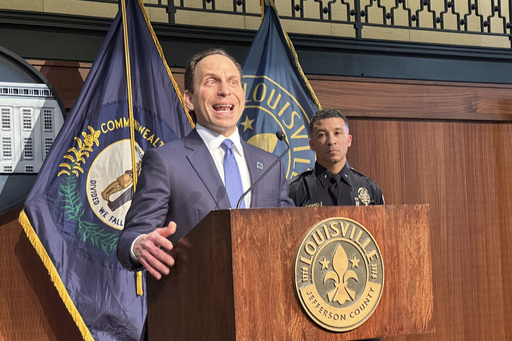
LOUISVILLE, Ky. — A new agreement reached between the U.S. Department of Justice and Louisville officials aims to bring significant reforms to the city’s police department. This arrangement follows an extensive federal investigation that scrutinized the department’s practices in the wake of Breonna Taylor’s tragic shooting and the treatment of demonstrators. Officials announced the deal on Thursday, marking a proactive move towards improving community relations and accountability within law enforcement.
The consent decree now awaits judicial approval and emerges from findings indicating that Louisville police have consistently violated constitutional rights and discriminated against Black citizens. Mayor Craig Greenberg emphasized that this agreement represents an acceleration of reforms in community policing. He pointed out that major changes have already taken root since the March 2020 incident, notably the prohibition of “no-knock” warrants, which had previously been a standard practice.
Breonna Taylor was just 26 when police forcibly entered her home shortly after midnight on March 13, 2020, leading to a chaotic sequence where she was shot multiple times. This incident has profoundly impacted discussions surrounding policing and accountability in the city. Tamika Palmer, Taylor’s mother, voiced her concerns during the announcement, stressing the importance of seeing tangible actions rather than mere promises from city officials.
“We have a history of putting things on paper and not moving the needle,” Palmer remarked, advocating for ongoing vigilance to ensure that commitments translate into real change. She received a $12 million settlement from the city for the wrongful death of her daughter in 2020.
Since Taylor’s death, the Louisville police department has seen significant leadership shifts, with the latest chief, Paul Humphrey, acknowledging the agreement with federal authorities. He expressed that the independent monitor’s role would enhance community trust by affirming the quality of police work. “This has to be more than just words on a page,” he stated, emphasizing the importance of leading and supporting the department properly.
The Justice Department’s report from March 2023 highlighted several critical issues within the Louisville police department, labeling it as discriminatory towards Black individuals, and criticized its use of excessive force and invalid search warrants. Additionally, the report noted that the department infringed upon the rights of individuals participating in protests, undermining essential public trust. Assistant Attorney General Kristen Clarke described this decree as a pivotal moment for Louisville.
Once finalized, the consent decree will mandate that Louisville police reform their use-of-force policies, ensure that traffic stops and searches comply with constitutional standards devoid of racial bias, and enhance their approach to handling public protests related to policing, among other stipulations.
Under the Biden administration, the Justice Department has launched 12 civil rights investigations involving various law enforcement agencies, yet this marks the inaugural instance leading to a consent decree. Previously, a similar agreement was made with the city of Springfield, Massachusetts, stemming from an investigation initiated during Donald Trump’s presidency.
In contrast, officials in Memphis have opted for a different strategy concerning their law enforcement reforms, choosing to amend practices without formalizing a binding consent decree, despite a federal inquiry revealing patterns of excessive force and racial disparity against Black individuals. While there remains a possibility for them to embrace such an agreement, they have asserted that swift changes can be executed independently.
Looking ahead, it is uncertain how future city-Justice Department collaborations will evolve, particularly with the anticipated return of Donald Trump and potential shifts in civil rights priorities within the Department of Justice. The previous administration had notably restricted the use of consent decrees, and similar changes may be expected once again.
